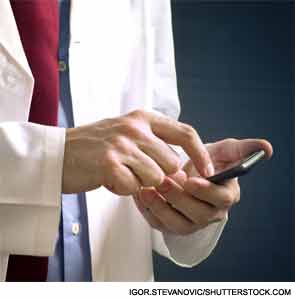
The desire to make a connection with patients, along with concern about keeping contact with them manageable, creates a certain tension over a staple of modern life: the ubiquitous cell phone. Should doctors call patients using their personal cell phones, and should patients be allowed to call doctors on these phones?
With many otolaryngologists and other physicians using cell phones as a matter of course throughout the day, physicians sometimes give out their cell phone numbers to patients, despite concerns about privacy. Others are not as inclined to do so.
Protecting Private Digits
Christina Gillespie, MD, an otolaryngologist at Ocean Otolaryngology Associates in Toms River, N.J., said she does not give out her number. “I don’t make it a habit to give my cell phone number to patients,” she said. “In my current job, we have an answering service [used during nights and weekends], so if they need to get hold of us they can call the answering service.”
She sees her choice to not give her cell number out to patients as improving, rather than inhibiting, the logistics of patient care. Because the answering service is prompt and efficient at getting messages from patients, she has no concern that she won’t get a message when it’s appropriate.
Also, she said, there are times—during vacations, for example—when she is unavailable. In those cases, it is far better for patients who call the office to be connected to an answering service that will be able to put them in touch with a doctor on call. “They may be trying to reach you on your cell phone, but you may not be reachable; that also wouldn’t be the best,” she said. “To some extent, you have to have a system where patients should always be able to reach somebody without having to call multiple different numbers.”
Physicians who want to make a call to a patient on a cell phone but prefer to keep the number private can simply hit *67 before dialing, change the phone’s settings to turn “Show Caller ID” to off, or use a similar privacy setting.
Do Patients Want to Call?
A 2005 study assessed the way patients use physicians’ cell phone numbers once they have them (Clin Orthop Relat Res. 2005;439:260-268). Calls to a secretary, a surgical scheduler, and a surgeon’s cell phone number were recorded. Researchers found that 20 of 32 consecutive patients made 65 calls over two months. Only 12 of the calls, or 18%, were to the surgeon, and half of those 12 calls were considered “urgent” in nature, as opposed to 14% of the calls to the secretary and 15% of the calls to the scheduler.
A subsequent survey found that 85% of patients would call the surgeon, and 30% would prefer the surgeon as the first line of communication, with e-mail and home phone communication less desirable. Seventy-two percent said they thought having cell phone access suggested their surgeon was more caring.
“Patients desired to communicate directly with surgeons, but act with restraint and call as a last resort for mostly urgent issues if given the physician’s cellular telephone number,” researchers wrote.
Your Experience May Vary
Anecdotally, experiences vary for physicians who have given out their cell phone numbers.
In a published essay, Winthrop Dillaway, MD, retired assistant professor of family medicine at the University of Medicine and Dentistry in New Jersey, said he grew comfortable with giving out his cell number because of positive experiences and gave patients the number three or four times a day (Fam Pract Manag. 2009;16:24-25).
“Intuitively, physicians do not want to give out their personal phone numbers to patients,” he wrote. “We expect that too many patients would be intrusive and inappropriate. I find the opposite; only once or twice a month do I get after-hours phone calls on my cell phone.”
“I have found that it decreases my stress to know that my sick and worried patients can easily reach me if needed,” he continued. For physicians who would like to try it, he suggested trying it with one or two patients, then gradually increasing that number or abandoning it if it doesn’t work.
In a letter responding to that essay. Jonathan Dreazen, MD, a family medicine physician in Pennsylvania, said he has “devoted and loyal patients,” but they would still call after hours about issues that weren’t critical. His wife, he said, “found after-hours calls an unpleasant intrusion into our lives,” especially when they dealt with non-urgent matters.
Douglas Van Daele, MD, assistant professor of otolaryngology-head and neck surgery at the University of Iowa Carver College of Medicine in Iowa City, said his colleagues who give out cell numbers tend to tell patients that they are to use it only for certain questions or issues, and never for emergencies, for which they should always call the on-call or triage personnel.
Dr. Van Daele does not give out his own number. “The general consensus that I have heard is that mobile phone access by patients is much more invasive than other means of communication,” he said. “I agree with that philosophy. It is entirely possible that I would not be in a place or position to fully attend to the patient or their issues if they have such direct access.”
That said, he added, “The truth is that most patients would not likely use the option of calling directly and would see it as a token of value. Most doctors wouldn’t want to chance it, though.”
Thomas Collins is a freelance medical writer based in Florida.
Article adapted with permission from the American College of Rheumatology.
Leave a Reply